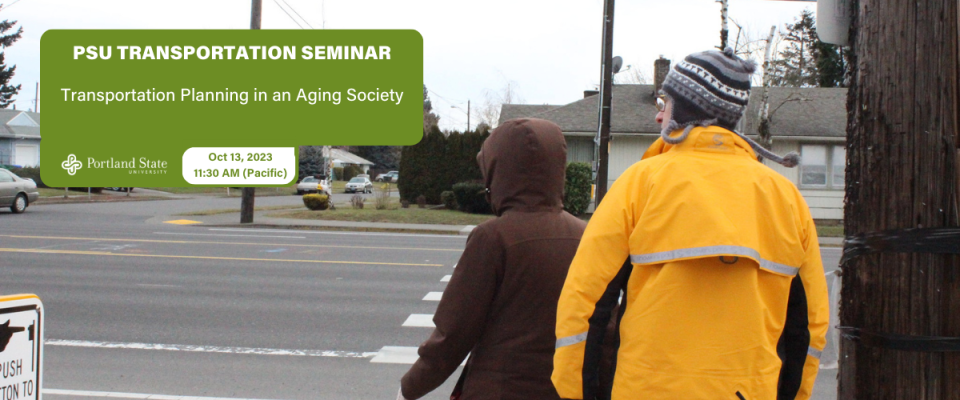
Transportation Seminars at Portland State University have been a tradition since 2000. Formerly known as the Friday Transportation Seminar series, we've opened up PSU Transportation Seminars to other days of the week to better accommodate attendance. You can always watch online via Zoom.
PRESENTATION ARCHIVE
THE TOPIC
By 2030, all Baby Boomers (those born between 1946 and 1964) will be 65 and older in the U.S. However, the understanding of how Baby Boomers travel differently from the previous generations, and the opportunities and challenges of older people's travel, do not keep pace with the increasing number of older people.
This presentation starts with an overview of transportation policies for older people and challenges, followed by several empirical studies investigating older people's generational travel differences, vehicle ownership over the life course, and the interaction of technology usage and travel among older people. It concludes with a policy agenda and a theoretical framework of transportation planning for future aging populations.
KEY LEARNING OUTCOMES
- Current transportation policies have not fully considered the heterogeneous needs of the Baby Boomer generation.
- On average, individual vehicle travel of Baby Boomers is not so necessarily much greater than that in the Silent Generation.
- Socially disadvantaged older people, including retirees, older adults living alone, and those having difficulties using technology have higher possibility of transitioning into zero-vehicle households and have fewer essential trips.
- Transportation planning for older people requires shared governance from transportation, urban planning, public health, and social services.
SPEAKER
Shengxiao (Alex) Li, Visiting Assistant Professor, University of Oregon
Shengxiao (Alex) Li is a Visiting Assistant Professor in the School of Planning, Public Policy, and Management at the University of Oregon (UO). Prior to joining UO, he was an adjunct lecturer and a postdoctoral researcher at the University of California, Riverside. His research interests broadly cover transportation equity issues, interaction of land use and transportation, urban planning for an aging society, and local sustainability actions and governance. His recent research projects examine local climate actions in the Inland Southern California, the role of built environment in traffic stop decisions, and equitable transit-oriented development. His recent peer-reviewed publications appear in major transportation, planning, and social policy journals including Journal of American Planning Association, Journal of Planning Literature, Transportation Research Part A, Transportation, and Journal of Aging and Social Policy. He holds a PhD in City and Regional Planning from the University of Pennsylvania and obtained his master's and bachelor's degrees from Peking University, China.PROFESSIONAL DEVELOPMENT
This 60-minute seminar is eligible for 1 hour of professional development credit for AICP (see our provider summary). We can provide an electronic attendance certificate for other types of certification maintenance.
ADD TO CALENDAR
Photo courtesy of Portland Bureau of Transportation
Portland State University's Transportation Research and Education Center (TREC) is home to the U.S. DOT funded National Institute for Transportation and Communities (NITC), the Initiative for Bicycle and Pedestrian Innovation (IBPI), PORTAL, BikePed Portal and other transportation grants and programs. We produce impactful research and tools for transportation decision makers, expand the diversity and capacity of the workforce, and engage students and professionals through education and participation in research.

